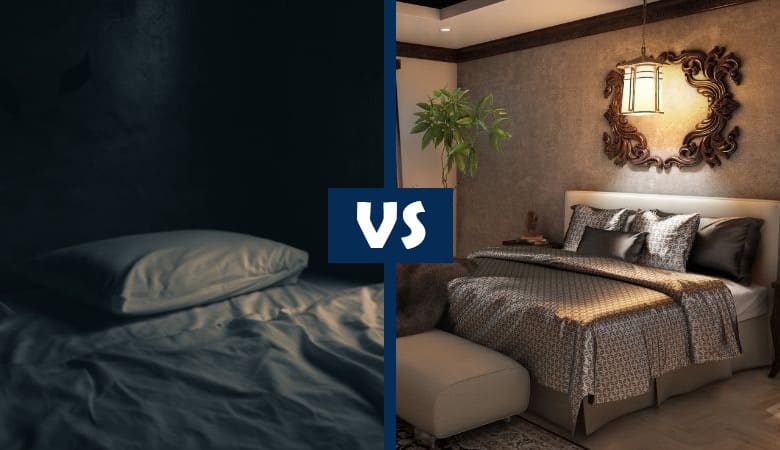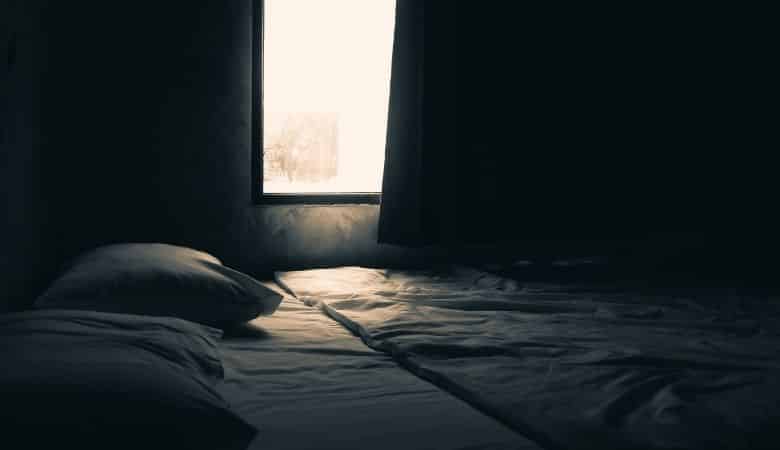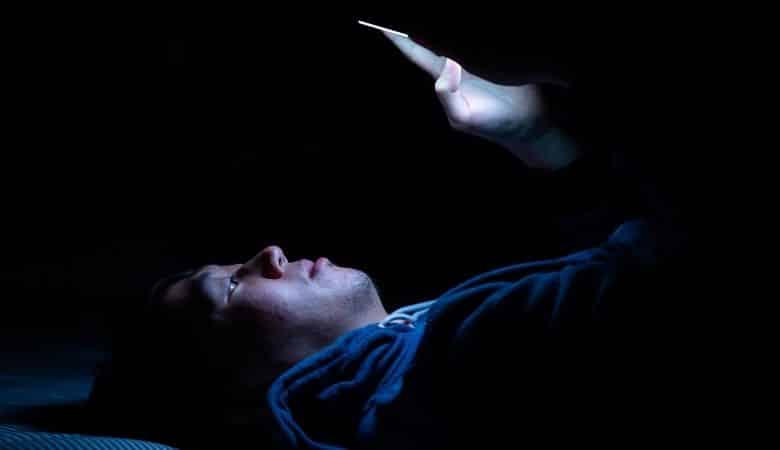It is second nature for most people to turn the bedroom lights off before going to bed. However, some people prefer to sleep with the lights on for a slew of reasons. This brings up the age-old question, should you sleep in a light or dark room?
According to research, it is better to sleep in a dark room because light plays an integral role in regulating our internal body clock. Your body follows a sleep-wake cycle dependent on several external factors, including light. So when the room is dark, your brain produces sleep-inducing melatonin to facilitate a whole night’s rest.
Sleep helps enhance your mood, fight illnesses, aid in muscle recovery, and even facilitates growth in children. Therefore, you need to create a comfortable environment for sleep that enables your brain to create a solid sleep-wake cycle.
Keep reading to find out the effects of sleeping in a light bedroom and tips for keeping your bedroom dark.

How Does Light Affect Sleep?
Believe it or not, light has a significant impact on your sleep-wake cycle. Therefore, you need to understand the effects before deciding to sleep in a dark bedroom. They vary from limiting melatonin production to causing circadian rhythm disorders.
1. Reduces the production of melatonin
Melatonin is a hormone that aids in sleep by calming the body. Melatonin levels rise in the evening as the brain responds to darkness, allowing you to fall into a state of relaxation. It is a vital element of your sleep-wake cycle that promotes healthy sleep.
When you sleep in a light bedroom, the body suppresses the production of melatonin. As a result, your brain gets the indication that it’s not time to sleep yet, which causes poor sleep, and you wake up feeling tired. In fact, this hormone is so crucial that companies manufacture synthetic melatonin to aid those with sleeping disorders, like insomnia.
2. Misaligns the circadian rhythm

Circadian rhythms perform different functions to aid our internal body clock. One of the most critical rhythms is the sleep-wake cycle. That’s what determines when you go to sleep or wake up. The process is simple; when light hits your eye, your cells send signals to the brain indicating that it’s not yet bedtime.
Typically, the sleep-wake cycle relies on natural light to function; it responds to sunset and sunrise. Therefore, when you constantly expose your eyes to light, the circadian rhythm may detect wrong signals, leading to less sleep time and a misaligned sleep-wake cycle.
3. Causes sleep disorders
When you’re always tired, you’re bound to experience sleep disorders. This is because tampering with the sleep cycle reduces the quality of sleep, which results in these disorders. Common sleep disorders include insomnia (the inability to fall asleep) and narcolepsy, which causes people to fall asleep suddenly due to fatigue.
4. Depression
You read that right; sleeping in a light bedroom can cause depression. Research shows that the sleep disturbances, such as lack of melatonin production and sleep-wake cycle misalignment, can lead to depression. Researchers also link the blue light from electronic devices to depression, advising people not to use their electronic devices close to bedtime.
Exposure to light at bedtime leads to less sleep time, which in turn affects your mood. As a result, you become irritable and sad due to fatigue and a misaligned circadian rhythm.
Generally, sleeping in a light bedroom affects your sleep pattern, which can have serious side effects on your health. Apart from depression, other effects of lack of sleep include obesity, chronic illness like diabetes and high blood pressure, and 24/7 fatigue. You can avoid all these effects by sleeping in a dark room for adequate sleep.
How do You Maintain a Dark Bedroom For Better Sleep?

Now that you’re aware of the effects of sleeping in a light bedroom, you’re probably wondering how to maintain a dark bedroom. Well, here are a few tips you can use to ensure you always sleep in a dark bedroom.
1. Switch off the lights
The most apparent solution to maintaining a dark bedroom is switching off the lights before retiring to bed. Whether it’s a ceiling light, a bedside lamp, or a corridor light, switch off the light and sleep in a pitch-black bedroom. The darker the room, the easier it is for you to fall asleep because the pineal gland starts secreting melatonin.
It is also advisable to limit screen time before bedtime as it delays melatonin production. The average time is two hours before bedtime. Allow your body to relax as you transition into sleep for better results.
But what happens if street lights and lights from other parts of the house penetrate your bedroom?
2. Install blackout blinds and/or curtains
Sometimes, there are unavoidable light sources, such as street lights or headlights from neighborhood cars. Blackout blinds and curtains are effective in blocking light from penetrating your room. They also work well during the day when you want to take a nap without the glare of the sun. If you have babies, blackout curtains will ensure they have extended naps during the day as well.
You can also get creative by installing built-in blinds and putting a blackout curtain on top of it. If you have lighter window drapery, consider dressing your windows at bedtime using other heavy materials. They include blankets, aluminum foil, plywood, cardboard, or a blackout window film.
Learn more about blackout curtains here.
3. Cover spaces that let in unnecessary light
If you want a dark room, keeping your door closed is the first option. But in some instances, the gap between the floor and your door is a potential source of light. The light can come from the hallway or other rooms in the house, like the living room. Therefore, make a point to cover the gap with a thick mat or a rolled-up towel.
Alternatively, you can turn off the intruding light if it’s not in use, although this may be tricky if you don’t live alone.
4. Turn off all electronic devices

As mentioned earlier, the blue light from electronic devices can mess up your sleep pattern and even cause depression in extreme cases. Most people spend hours on their phones before bedtime or go to sleep while watching a movie.
This routine is bound to postpone the production of melatonin, causing you to sleep very late. In fact, experts say it is advisable to limit the use of electronic devices 2 hours before bedtime.
Therefore, always turn off all unnecessary electronic devices, such as the TV, computers, e-readers, or your phone. In addition, you can also unplug energy-saving bulbs and other devices that might glow in the dark. Alternatively, you can use electric tape to cover light sources that stay on all night.
5. Sleep with a mask on
If all else fails, you can always put on an eye mask to block out all the light. Manufacturers use heavy material to design snug-fitting eye masks. You can use these during the day or at night to facilitate the production of melatonin. Eye masks are also readily available; you can purchase them online or at your local store.
Amazon have some great sleep masks available.
6. Paint your room using darker shades
Using a darker shade of paint is also effective for darkening your room. A dark bedroom absorbs the extra light making your room dimmer. Therefore, if you’re looking for a long-term solution, you can use a darker shade like navy blue, black, or dark green. These are all great colors for a bedroom.
You can always use stylish furniture and drapes to make the room more vibrant if it appears dull after painting.
What if You Can’t Sleep in a Pitch-Black Room?
Although sleeping in a pitch-black room is the best solution for better sleep, some people still prefer a light bedroom. For some, it’s a personal preference, others need a lighting path to the bathroom, and some are just afraid of the dark. It is normal.
So, what happens in such cases? There are ways to ensure the light doesn’t affect your sleep, but they may not be as effective as sleeping in a dark bedroom.
1. Dim the lights

You don’t have to turn your lights off completely. If you’re not comfortable sleeping in a pitch-black room, try dimming the lights 2 hours before bedtime. Reducing the light levels will also send a signal to your brain to produce melatonin. You can also switch off the ceiling light and use dimmer bedside lamps throughout the night.
However, don’t forget to switch off other electronics in the room.
2. Avoid daytime naps
Daytime naps might cause a lack of sleep in the evening if you sleep with your lights on. Avoiding naps will ensure you’re tired enough to dose off faster once without paying attention to the light. You should also avoid strong drinks like alcohol and caffeine before bedtime.
3. Maintain a solid routine
This step might be difficult, but sticking to a sleep routine will align your circadian rhythm. Go to sleep and wake up at the same time for an extended period until your body adjusts. After some time, your internal clock will follow this new routine, making it easier for you to sleep in a light bedroom.
Other bedtime routines include taking a shower, reading using low light, or meditating. You can also change the room temperature to relax your body.
4. Use blue light–blocking glasses
Exposure to blue light is also detrimental to your sleep. Therefore, if you must check your phone or watch a movie a few minutes before bedtime, use blue-light-blocking glasses. These glasses block the blue rays from hitting your eye and limiting the production of melatonin.
These glasses are also available on Amazon. You can check them out here.
5. Stay active
Exercising is an excellent way to ensure you get a good night’s sleep. However, make sure you exercise earlier in the day to give your body time to relax. When you exercise, your core body temperature increases, making you hyper. Exercising earlier gives your body time to adjust, and as the body temperature lowers, you begin to feel sleepy.
Sleeping in a light bedroom requires a lot of discipline to avoid its side effects.
Conclusion
Overall, better sleep quality is dependent on sleeping in a dark room. You also become healthier and more productive if you get adequate sleep.
Being aware of the side effects of sleeping in a light bedroom will help you pay attention to your bedroom lighting.
Taking time to create a comfortable bedroom will have a positive impact on your sleep-wake cycle. Hopefully, this article helps you make a better sleep environment. All the best!
